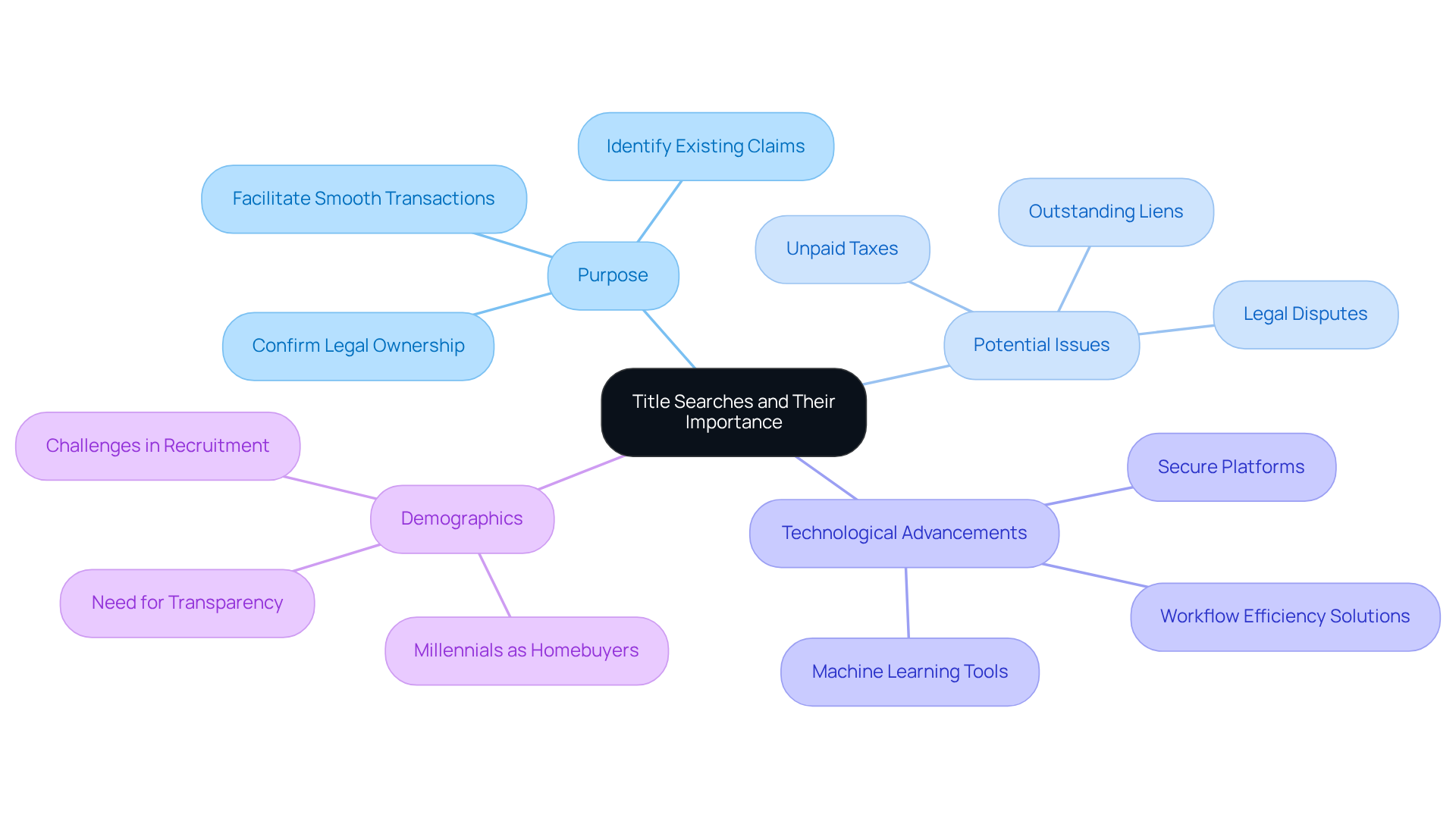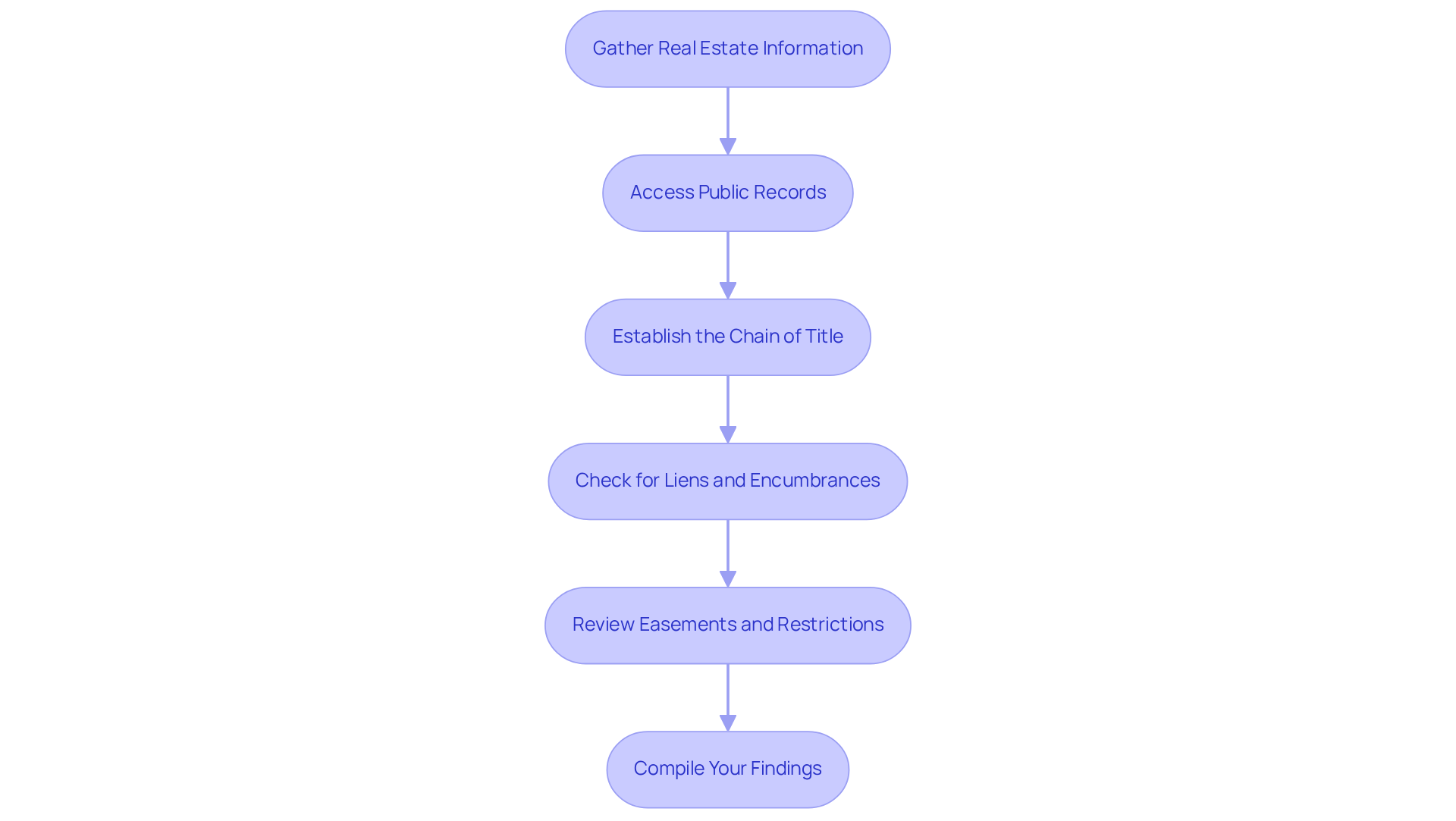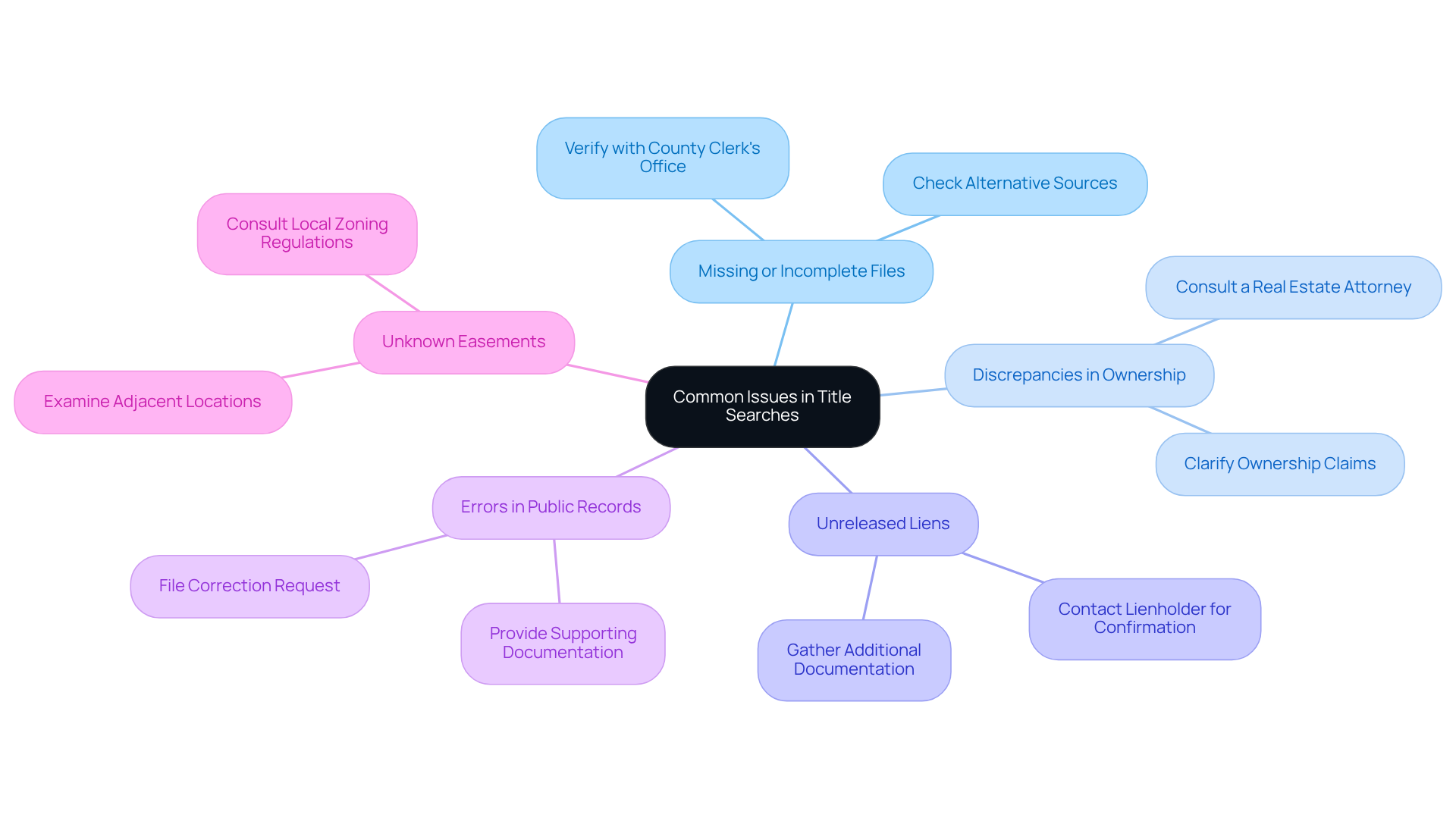Introduction
Navigating the complexities of real estate transactions demands a keen understanding of title searches. This vital process not only verifies property ownership but also uncovers potential legal issues that could arise. Mastering the art of conducting a title search by name empowers individuals to protect themselves from unexpected financial burdens and ensures a smooth transfer of property rights.
However, various challenges can complicate this critical procedure. The following issues may create significant obstacles:
- Missing documents
- Discrepancies in ownership
- Hidden liens
So, how can one effectively streamline this essential process?
By addressing these challenges head-on, individuals can enhance their confidence in real estate transactions and safeguard their investments.
Understand Title Searches and Their Importance
A title examination, which includes a title search by name, involves a comprehensive analysis of public records to confirm the legal ownership of real estate and identify any existing claims or liens. This crucial process, involving a title search by name, guarantees that the seller has the authority to transfer ownership and that the property is free from encumbrances that could threaten the buyer's rights. A title search by name plays a vital role in uncovering issues such as unpaid taxes, outstanding liens, and legal disputes. If these matters are overlooked, they can lead to significant financial consequences.
For example, a recent case demonstrated how a property search revealed a prior lender's bankruptcy, averting potential complications for the buyer. Furthermore, with Parse AI's advanced machine learning tools, the research process for properties can be accelerated, enabling more thorough and accurate investigations. This technology enhances the ability to extract essential information from ownership documents, allowing researchers to finalize abstracts and reports more swiftly and precisely.
By recognizing the importance of document examinations, real estate professionals can safeguard their clients from legal challenges and facilitate a seamless transaction process. Additionally, as millennials now represent the largest segment of homebuyers, their demand for transparency and security in transactions further emphasizes the necessity of conducting a title search by name for thorough verification.

Follow Step-by-Step Procedures for Conducting a Title Search
-
Gather Real Estate Information: Begin by collecting all relevant details about the real estate, including the address, parcel number, and performing a title search by name to find the current owner's information. This information is crucial for a title search by name to locate the accurate documents.
-
Access Public Records: Visit the local county recorder's office or access their online database. Search for real estate deeds, tax records, and any other pertinent documents. Keep in mind that a typical title search can take between 10 and 14 days to complete, but older real estate may require longer searches.
-
Establish the Chain of Title: Review the history of ownership by tracing back through previous deeds. This process helps verify that the current owner has the authority to sell the asset.
-
Check for Liens and Encumbrances: Investigate any outstanding liens, such as mortgages or tax liens, that may affect the asset. This step is essential to ensure that the buyer will not inherit any debts associated with the property.
-
Review Easements and Restrictions: Identify any easements or restrictions that may limit the use of the land. Understanding these limitations is vital for potential buyers.
-
Compile Your Findings: Document all findings in a clear and organized manner. This report will serve as a reference for any future transactions or legal matters related to the property. Additionally, consider purchasing title insurance to protect against ownership issues, and conduct a title search by name while checking the Better Business Bureau for complaints against potential title search companies.

Troubleshoot Common Issues in Title Searches
-
Missing or Incomplete Files: Encountering absent documents can be a significant hurdle in your title search. Verify with the county clerk's office for any archived files or alternative sources, as documents may be stored in various locations.
-
Discrepancies in Ownership: Conflicting ownership claims can complicate matters. Consulting with a real estate attorney is essential to clarify the situation. Legal advice not only resolves disputes but also ensures that all documentation is in order.
-
Unreleased Liens: Discovering liens that should have been released can pose a challenge. Contact the lienholder for confirmation, as additional documentation may be required to clear the title effectively.
-
Errors in Public Records: Errors in public records can lead to significant delays. If you find inaccuracies, file a correction request with the appropriate office. Providing supporting documentation can expedite the correction process.
-
Unknown Easements: Unrevealed easements can impact property use. Investigate further by examining adjacent locations and consulting local zoning regulations. Understanding these easements is crucial for making informed decisions about your property.
By recognizing these common issues and knowing how to address them, you can streamline the title search by name process and avoid potential setbacks.

Conclusion
Conducting a title search by name is crucial for verifying property ownership and shielding buyers from potential legal issues. By thoroughly examining public records, individuals can ensure that sellers possess the rightful authority to transfer ownership and that the property is free from encumbrances. This process not only protects financial interests but also builds trust in real estate transactions, especially as new generations of homebuyers increasingly demand transparency.
This article provides a detailed step-by-step guide for executing an effective title search. Key steps include:
- Gathering real estate information
- Accessing public records
- Establishing the chain of title
- Checking for liens and encumbrances
Additionally, troubleshooting common issues—such as missing documents, discrepancies in ownership, and errors in public records—is vital for a seamless title search process. Leveraging advanced technologies, like those offered by Parse AI, can significantly enhance the efficiency and accuracy of these investigations.
Ultimately, grasping the importance of a title search by name empowers both buyers and real estate professionals to navigate the complexities of property transactions with confidence. By proactively conducting thorough title searches and addressing potential issues directly, stakeholders can protect their investments and contribute to a more secure and transparent real estate market. Engaging in this essential process is not merely a matter of due diligence; it represents a commitment to ensuring fair and equitable property ownership for all.
Frequently Asked Questions
What is a title examination and why is it important?
A title examination includes a title search by name, which is a comprehensive analysis of public records to confirm the legal ownership of real estate and identify any existing claims or liens. It is crucial for ensuring that the seller can legally transfer ownership and that the property is free from encumbrances that could threaten the buyer's rights.
What issues can a title search uncover?
A title search can reveal issues such as unpaid taxes, outstanding liens, and legal disputes. Overlooking these matters can lead to significant financial consequences for the buyer.
Can you provide an example of the importance of a title search?
A recent case demonstrated that a property search revealed a prior lender's bankruptcy, which helped avert potential complications for the buyer.
How does technology enhance the title search process?
Parse AI's advanced machine learning tools can accelerate the research process for properties, enabling more thorough and accurate investigations. This technology helps extract essential information from ownership documents, allowing researchers to finalize abstracts and reports more swiftly and precisely.
Why is document examination important for real estate professionals?
Document examinations help real estate professionals safeguard their clients from legal challenges and facilitate a seamless transaction process.
What demographic emphasizes the need for thorough title searches?
Millennials, who now represent the largest segment of homebuyers, demand transparency and security in transactions, further emphasizing the necessity of conducting a title search by name for thorough verification.




